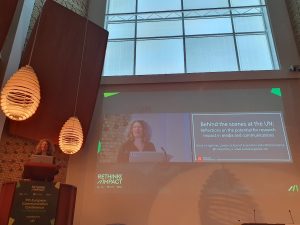Rethink Impact – thoughts from the conference floor …
Professor Sonia Livingstone, LSE, gave the opening ECREA 2022 keynote with the title: Behind the scenes at the UN: Reflections on the potential for research impact in media and communications. The conference theme is Rethink impact – a vitally important topic (always, and, sadly, presently more than ever) for researchers in academia and for society. Sonia Livingstone is one among few scholars who could so convincingly address the questions about balancing rigorous, ethical, methodologically, and theoretically sound and innovate academic research with close collaboration with cross-sector stakeholders, from small NGOs, big companies, and, in Sonia Livingstone’s case, the United Nations (hence the first part of the title). Many important questions were raised during the talk and the following discussion, framed by the narrative about how the impact of research on children’s digital rights and opportunities moved from growing within academia to reach political attention, and, in 2021, resulting in the publication (March 2021) of the UN’s General comment No. 25 (2021) on children’s rights in relation to the digital environment. The journey towards this amazing achievement is an (neverending) amazing endeavor, involving years and years of hard work, networking, evidence-based arguments, lobbying, endless nights, and weekends spent on writing, editing, rewriting. One of the messages was that to make direct impact happen, basically obtained on the results of hard – and innovative – research work, is not for everyone. Well, at least not at the level of getting a General Comment through the political UN system. But impact happens at all levels and through the individual researcher’s integrity and ethical approach to research. This is increasingly an area of interest, particularly at universities, but also at the political level, and, perhaps indirectly, in public debates that, sometimes, has a strong element of academia-bashing.
Rethink impact – a vitally important topic (always, and, sadly, presently more than ever) for researchers in academia and for society. Sonia Livingstone is one among few scholars who could so convincingly address the questions about balancing rigorous, ethical, methodologically, and theoretically sound and innovate academic research with close collaboration with cross-sector stakeholders, from small NGOs, big companies, and, in Sonia Livingstone’s case, the United Nations (hence the first part of the title). Many important questions were raised during the talk and the following discussion, framed by the narrative about how the impact of research on children’s digital rights and opportunities moved from growing within academia to reach political attention, and, in 2021, resulting in the publication (March 2021) of the UN’s General comment No. 25 (2021) on children’s rights in relation to the digital environment. The journey towards this amazing achievement is an (neverending) amazing endeavor, involving years and years of hard work, networking, evidence-based arguments, lobbying, endless nights, and weekends spent on writing, editing, rewriting. One of the messages was that to make direct impact happen, basically obtained on the results of hard – and innovative – research work, is not for everyone. Well, at least not at the level of getting a General Comment through the political UN system. But impact happens at all levels and through the individual researcher’s integrity and ethical approach to research. This is increasingly an area of interest, particularly at universities, but also at the political level, and, perhaps indirectly, in public debates that, sometimes, has a strong element of academia-bashing.
Things have developed in this area, in my own history since the late 1980s, and collaboration with cross-sector stakeholders is not only encouraged, but expected, also in relation to research funding. I think back to my relatively early career research (probably mid 90s) at the Faculty for the humanities, Copenhagen University, when I was, politely but firmly, invited to present my research strategies to the Faculty Board, because I collaborated with numerous stakeholders like the united unions, NGOs, companies, institutions. The inherent perception was that this could (some would say would) endanger academic integrity and reduce the value of academic research. The outcome of the meeting was actually quite ok and the group of people who were participating were quite interested in what I had to say. I am sure that many of my colleagues did what I did, but it did feel like a kind of defining moment for me. And I started to seriously consider how to maintain academic ambition and quality in my work while also exploiting the benefits of collaborating with various stakeholders – a topic that was also addressed at the ECREA 2022 keynote today.
Balancing academic freedom of research and integrity and ambition for innovation with meeting demands for directly applicable results is still, not least in a ‘from research to billing’ era, a major challenge. Academic research must be allowed to be explorative, to challenge norms, to go against expected outcomes.
That said, I definitely find that collaboration with stakeholders has a strong potential to inform and (contribute to) innovate research and that research has great potentials to be translated into evidence-based policy making at all levels. The example of Sonia Livingstone’s achievements is an outstanding example of this – and at this and many other conferences we hear about many, many other examples of ‘everyday’ impact of research based evidence. One of the final points, which Sonia Livingstone made was, that she, not least on behalf of young scholars, wishes that ‘impact’ could be part of our contracts and part of the acknowledgement of academic achievements. And note: collaboration with stakeholders and external funding is not the same as making an impact; impacting change is.
